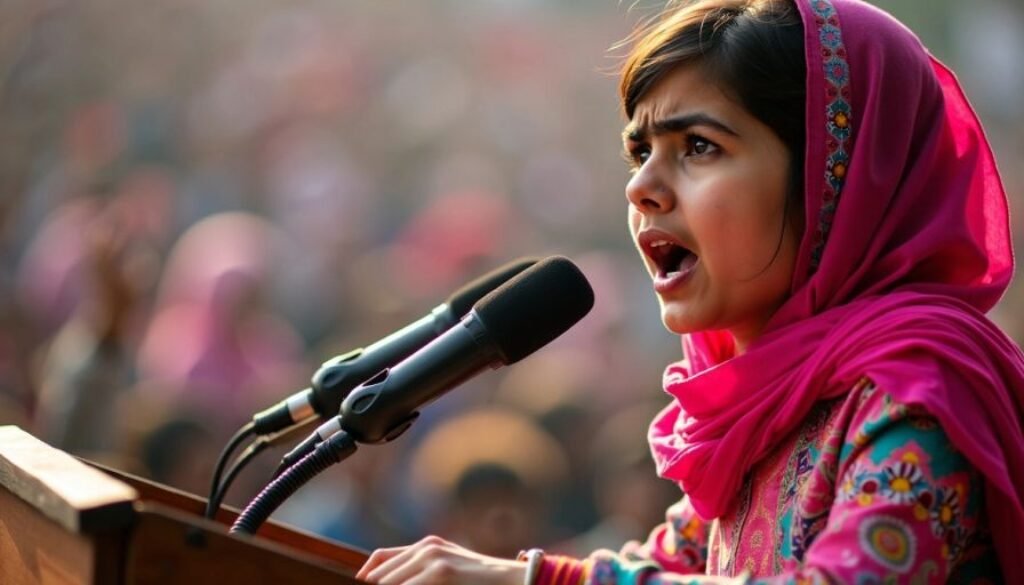The Impact of Malala Yousafzai on Education Advocacy
admin@theupinews Culture, Health 0
Malala Yousafzai is a name that echoes around the world when it comes to education advocacy. Born in Pakistan, she stood up against the Taliban’s ban on girls’ education and paid a high price for her courage. Despite being attacked, Malala’s voice only grew stronger. She has become a global symbol of the fight for girls’ education, inspiring millions to join her cause.
Key Takeaways
- Malala Yousafzai began her activism at a young age, speaking out for girls’ right to education in Pakistan.
- The Taliban’s violent response to her activism only strengthened her resolve and brought global attention to her cause.
- After recovering from an assassination attempt, Malala continued her advocacy from England, gaining worldwide support.
- Malala co-founded the Malala Fund, which works to ensure every girl has access to 12 years of free, safe, quality education.
- Her efforts have significantly influenced global education policies, making her a key figure in the fight for educational equality.
Malala Yousafzai's Early Life and Background

Growing Up in Swat Valley
Malala Yousafzai was born on July 12, 1997, in Mingora, a town in the Swat Valley of Pakistan. The Swat Valley, known for its stunning landscapes, became a challenging place to live due to the rise of the Taliban. Malala’s early years were marked by the beauty of her homeland and the growing threat of extremism.
Family Influence on Education
Malala’s father, Ziauddin Yousafzai, was a teacher and ran a girls’ school in their village. He was determined to give Malala every opportunity a boy would have. This strong support from her family played a crucial role in shaping her views on education. Malala’s mother also encouraged her to pursue her dreams, despite the societal norms that often limited girls’ aspirations.
Early Signs of Activism
From a young age, Malala showed signs of being an activist. At just 11 years old, she began writing a blog under a pseudonym for the BBC Urdu, detailing her life under Taliban rule and her views on promoting education for girls. Her courage and determination to speak out, even in the face of danger, were evident early on. This quiet activism laid the foundation for her future as a global advocate for education.
The Taliban's Impact on Malala's Education
Taliban's Ban on Girls' Education
Growing up in Pakistan, Malala Yousafzai faced the harsh reality of the Taliban’s rule. The Taliban imposed a strict ban on girls’ education, making it dangerous for young girls to attend school. Malala’s defiance against this ban became a symbol of resistance.
Malala's Secret Blog
At just 11 years old, Malala began writing a secret blog under a pseudonym. She shared her experiences and the challenges she faced in getting an education. Her blog gained attention and highlighted the plight of girls in her region.
The Attack on Malala
In October 2012, Malala was targeted by a masked gunman who boarded her school bus and shot her. The attack left her in critical condition, but she miraculously survived. This event brought global attention to the fight for girls’ education and Malala’s bravery.
Malala’s act of defiance reinforced education’s critical role in combatting violence. Education helps comprise one of the eight pillars of Positive Peace, the building and protection of High Levels of Human Capital, which is paramount to achieving social resilience.
Malala's Recovery and Continued Advocacy
Medical Treatment in England
After the attack on Malala in 2012, she was flown to Queen Elizabeth Hospital in Birmingham, England, for urgent medical care. The doctors and nurses worked tirelessly to save her life, and after several months of surgeries and rehabilitation, she began to recover. This period was crucial not only for her physical healing but also for her mental and emotional resilience.
Global Support and Recognition
During her recovery, Malala received an outpouring of support from people around the world. Leaders, activists, and ordinary citizens sent messages of encouragement, reinforcing her resolve to continue her fight for girls’ education. This global recognition highlighted the importance of her cause and brought international attention to the issue of girls’ education.
Resuming Her Activism
Once she regained her strength, Malala faced a choice: to live a quiet life or to use her voice for change. She chose the latter. With her father, she co-founded the Malala Fund, an organization dedicated to ensuring every girl has the opportunity to learn and lead. Malala’s story emphasizes the transformative power of education and the impact one voice can have on the world.
The Establishment of the Malala Fund
Founding the Organization
In 2014, Malala Yousafzai and her father, Ziauddin Yousafzai, founded the Malala Fund. This nonprofit organization was established with the help of the Vital Voices Global Partnership to support education for all girls around the world. The goal was to ensure that every girl could achieve a future of her choosing.
Mission and Goals
The Malala Fund is dedicated to creating a world where every girl can learn and lead. Its mission includes:
- Advocating for resources and policy changes needed to give all girls a secondary education.
- Investing in education activists and advocates who are driving solutions to barriers to girls’ education in their communities.
- Influencing governments to invest in girls’ education and hold them accountable for their commitments.
Key Programs and Initiatives
The Malala Fund runs several key programs and initiatives, including:
- Education Champion Network: This program invests in local educators and activists in developing countries, helping them to break down barriers to girls’ education.
- Girl Programme: Aimed at empowering girls to share their thoughts, challenges, and accomplishments through a digital newsletter and publication called Assembly.
- Advocacy and Research: The fund conducts research and advocates for policy changes to ensure all girls receive 12 years of free, safe, quality education.
The Malala Fund is working tirelessly to create a world where every girl can learn and lead, breaking down the barriers that hold girls back from achieving their dreams.
Malala's Nobel Peace Prize Achievement

Nobel Prize Announcement
In October 2014, at just 17 years old, Malala Yousafzai became the youngest recipient of the Nobel Peace Prize. This prestigious award recognized her bravery and dedication to advocating for girls’ education, even in the face of extreme danger. Her efforts have inspired millions around the world to support the cause of education for all.
Significance of the Award
Malala’s Nobel Peace Prize was not just a personal achievement but a victory for all who believe in the power of education. The award highlighted the critical link between education and peace, emphasizing that educating girls can lead to more stable and prosperous societies. It also brought global attention to the ongoing struggles many girls face in accessing education.
Malala's Nobel Lecture
In her Nobel Lecture, Malala spoke passionately about her vision for the future. She expressed her desire to see every child receive a quality education, equal rights for women, and peace in every corner of the world. Her speech was a powerful reminder of the importance of education in achieving these goals. Malala’s words continue to inspire and motivate people to work towards a better future for all children.
Malala's Influence on Global Education Policies
Advocacy for Girls' Education
Malala Yousafzai has been a tireless advocate for girls’ education worldwide. Her efforts have brought significant attention to the barriers that girls face in accessing education. Malala’s story began when she took a stand against the Taliban’s ban on girls’ education in Pakistan. Her bravery and determination have inspired many to join the fight for educational equality.
Collaborations with International Organizations
Malala has worked with numerous international organizations to promote education for girls. Through the Malala Fund, she has partnered with groups like the United Nations and UNESCO to push for policy changes that support girls’ education. These collaborations have helped to amplify her message and reach a global audience.
Impact on Policy Changes
Malala’s advocacy has led to real changes in education policies around the world. Governments and institutions have been influenced by her message, leading to increased funding and support for girls’ education programs. Her work has shown that one person’s voice can indeed make a difference in shaping global education policies.
Educational Challenges Faced by Girls Worldwide
Barriers to Education
Girls encounter distinct challenges that impede their education, including cultural norms and practices and child marriage. These barriers often prevent girls from attending school or force them to drop out early. School-related gender-based violence is another significant issue that affects girls’ ability to learn in a safe environment.
Statistics on Girls' Education
| Region | Percentage of Girls Not in School |
|---|---|
| Sub-Saharan Africa | 52% |
| South Asia | 41% |
| Middle East and North Africa | 35% |
These statistics highlight the urgent need for targeted interventions to ensure that girls can access education.
Efforts to Overcome Challenges
- Changing Social Norms: Efforts are being made to change societal attitudes towards girls’ education. This includes community programs that promote the value of educating girls.
- Increasing Education Funding: Governments and organizations are called upon to fulfill their promises to fund education and ensure that the global financing system supports investment in education.
- Improving Education Quality: Education systems are being encouraged to challenge gender inequality and help build girls’ resilience to climate change, conflict, and other shocks.
The fight for girls’ education won’t be won by girls alone. Collective action and support from all sectors of society are essential to overcome these challenges.
By addressing these barriers and implementing effective strategies, we can make significant progress in ensuring that every girl has the opportunity to receive a quality education.
Malala's Higher Education Journey
Studying at the University of Oxford
In 2018, Malala began studying Philosophy, Politics, and Economics (PPE) at the University of Oxford. This prestigious program is known for producing influential leaders and thinkers. Malala’s enrollment at Oxford was a significant milestone in her journey, symbolizing her resilience and commitment to education.
Balancing Activism and Academics
While at Oxford, Malala balanced her studies with her ongoing activism. She continued to travel and speak out for girls’ education worldwide. Despite her busy schedule, she managed to excel academically, showing that dedication and hard work can overcome any challenge.
Graduation and Future Plans
In 2020, Malala graduated from Oxford University. She cherished her time at Lady Margaret Hall, enjoying lectures, club meetings, and late-night discussions with friends. Although the global pandemic affected her final months at university, she remained grateful for the experience. Malala is now more dedicated than ever to her fight for girls’ education, with plans to continue her advocacy work and inspire future generations.
Malala's Legacy and Ongoing Impact
Inspiring the Next Generation
Malala Yousafzai’s story has inspired countless young people around the world. Her bravery and determination have shown that even in the face of great danger, one person can make a difference. Her journey from a small town in Pakistan to becoming a global icon for education advocacy is a testament to the power of resilience and courage.
Continued Advocacy Work
Malala continues to be a strong voice for girls’ education. Through the Malala Fund, she works tirelessly to ensure that every girl has the opportunity to learn and grow. The organization focuses on areas where girls are most at risk of missing out on education, providing resources and support to help them succeed.
Global Recognition and Awards
Malala’s efforts have not gone unnoticed. She has received numerous awards and honors for her work, including the Nobel Peace Prize. These accolades highlight the significant impact she has had on the world and underscore the importance of her mission. Her advocacy for education has been featured in various impactful stories, showcasing her contributions to society.
The Role of the Malala Fund in Crisis Situations
Education in Conflict Zones
The Malala Fund plays a crucial role in ensuring that girls continue to receive an education even in the most challenging environments. Conflict zones often disrupt schooling, but the Malala Fund steps in to provide resources and support. They work with local partners to create safe learning spaces and offer psychological support to children affected by war and violence.
Emergency Response Programs
In times of crisis, the Malala Fund’s emergency response programs are vital. These programs are designed to quickly address the educational needs of girls who are displaced or affected by natural disasters and conflicts. The fund provides emergency education kits, temporary learning centers, and teacher training to ensure that education continues uninterrupted.
Success Stories from the Field
The impact of the Malala Fund’s work can be seen in numerous success stories. For instance, in Afghanistan, where 1000 days have passed since the Taliban banned girls’ education, the Malala Fund has been instrumental in supporting underground schools and advocating for girls’ right to learn. These efforts have given hope to many young girls and their families, showing that education can thrive even in the darkest times.
The Malala Fund’s commitment to education in crisis situations demonstrates the power of resilience and the importance of never giving up on the right to learn.
Malala's Vision for the Future of Education
Goals for Universal Education
Malala Yousafzai dreams of a world where every child has access to quality education. She believes that education is a universal right and should be available to all, regardless of gender, location, or economic status. Her vision includes ensuring that girls, in particular, have the same opportunities as boys to learn and grow. Malala’s work through the Malala Fund aims to break down the barriers that prevent millions of children from attending school.
Innovative Approaches to Learning
To achieve her goals, Malala supports innovative methods in education. This includes using new teaching techniques and materials that make learning more engaging and effective. She also advocates for flexible learning environments that can adapt to the needs of different students. By embracing these innovative approaches, Malala hopes to create a more inclusive and effective education system.
The Role of Technology in Education
Malala sees technology as a powerful tool to expand educational opportunities. She believes that digital learning platforms can help reach students in remote or underserved areas. Technology can also provide personalized learning experiences, making education more accessible and tailored to individual needs. Malala’s vision includes leveraging technology to ensure that every child can receive a quality education, no matter where they are.
Malala’s unwavering determination serves as a salient reminder that the universal right to an education should be protected. By refusing to bow to the Taliban’s ban on girls’ attendance in schools, Malala asserted her right and the right of all women to receive an education. Her quiet activism withstands as a model example of peaceful activism in the face of violence and terrorism.
Conclusion
Malala Yousafzai’s journey from a young girl in Pakistan to a global advocate for education is nothing short of inspiring. Her courage in the face of danger and her unwavering commitment to education for all girls have made a significant impact worldwide. Malala’s story teaches us that one voice can indeed make a difference. Through her work with the Malala Fund, she continues to fight for the right of every girl to receive an education. Her legacy reminds us that education is a powerful tool for change and that we all have a role to play in making the world a better place for future generations.
Frequently Asked Questions
Who is Malala Yousafzai?
Malala Yousafzai is a Pakistani activist who fights for girls’ right to education. She became famous after surviving a Taliban attack and winning the Nobel Peace Prize.
What happened to Malala when she was 15?
When Malala was 15, she was shot by a Taliban gunman while riding her school bus. She survived and continued her advocacy for education.
Why did Malala start her activism?
Malala began her activism because the Taliban banned girls from going to school in her hometown in Pakistan. She wanted to fight for her right and other girls’ right to education.
What is the Malala Fund?
The Malala Fund is an organization founded by Malala and her father. It works to ensure every girl can go to school and receive quality education.
What did Malala achieve by the age of 17?
By the age of 17, Malala had won the Nobel Peace Prize for her efforts in promoting education for girls worldwide.
Where did Malala go for her higher education?
Malala attended the University of Oxford in England, where she studied Philosophy, Politics, and Economics.
How has Malala influenced global education policies?
Malala has worked with international organizations and governments to push for changes that make education accessible to all girls.
What are some challenges girls face in getting an education?
Girls often face barriers like poverty, child marriage, and gender discrimination that prevent them from going to school.



